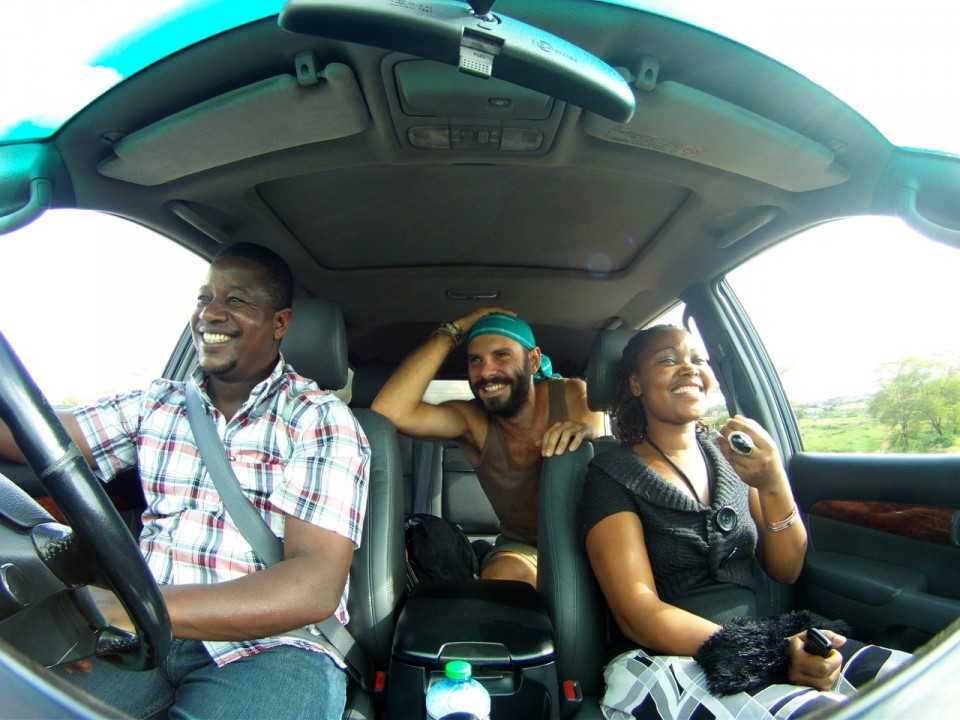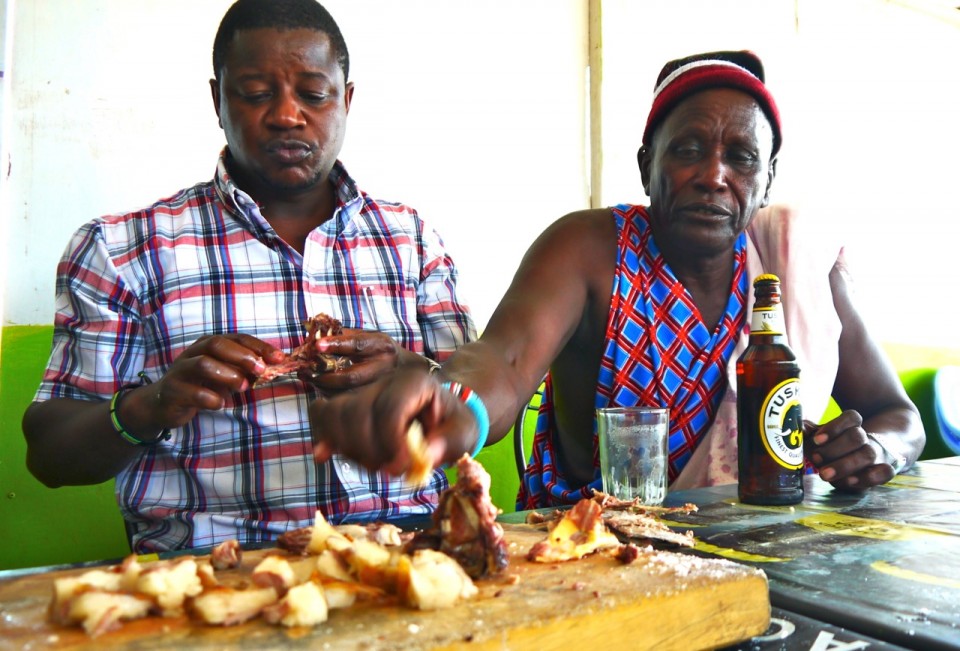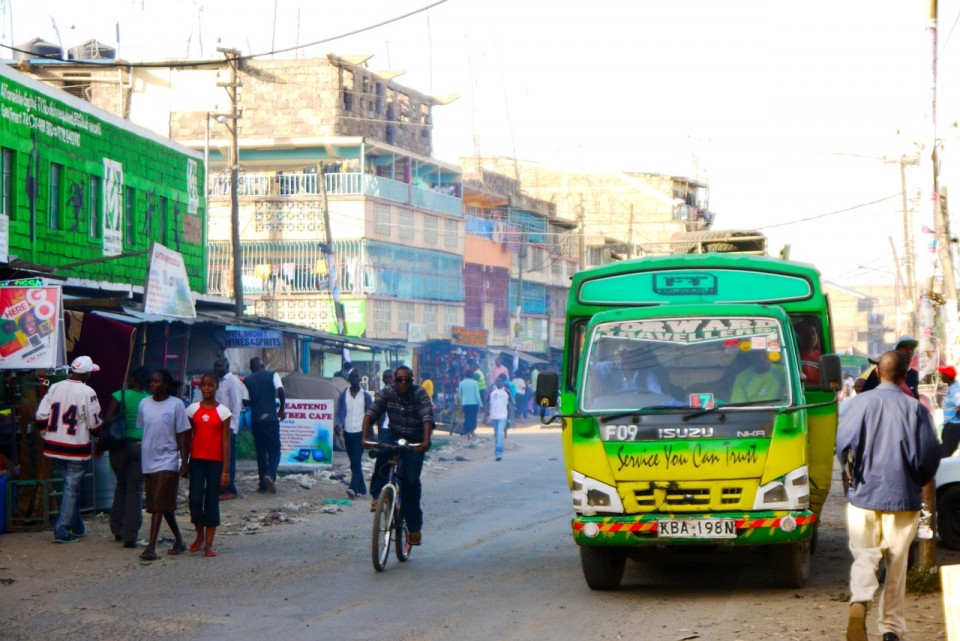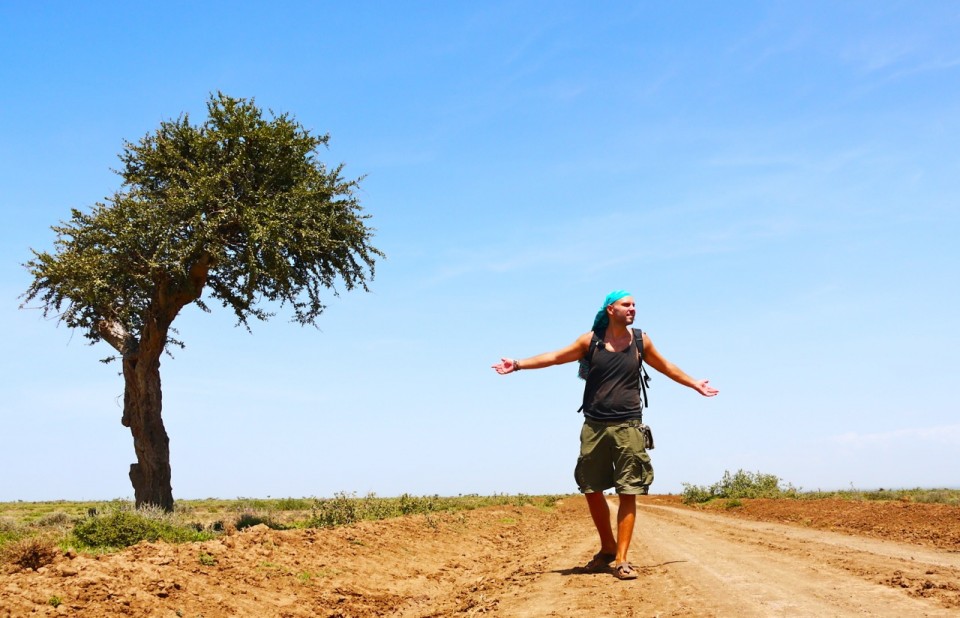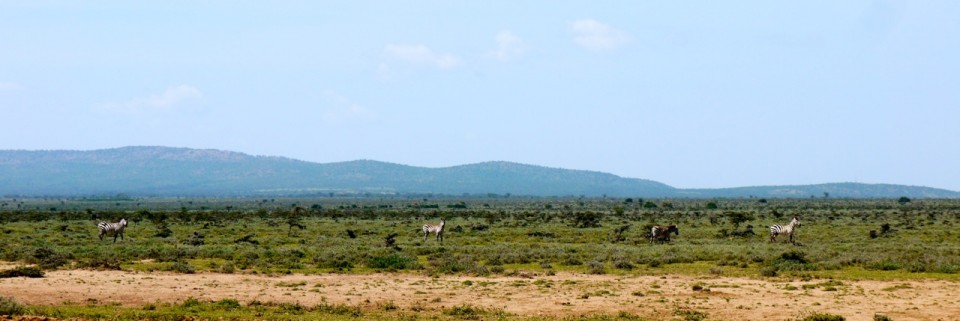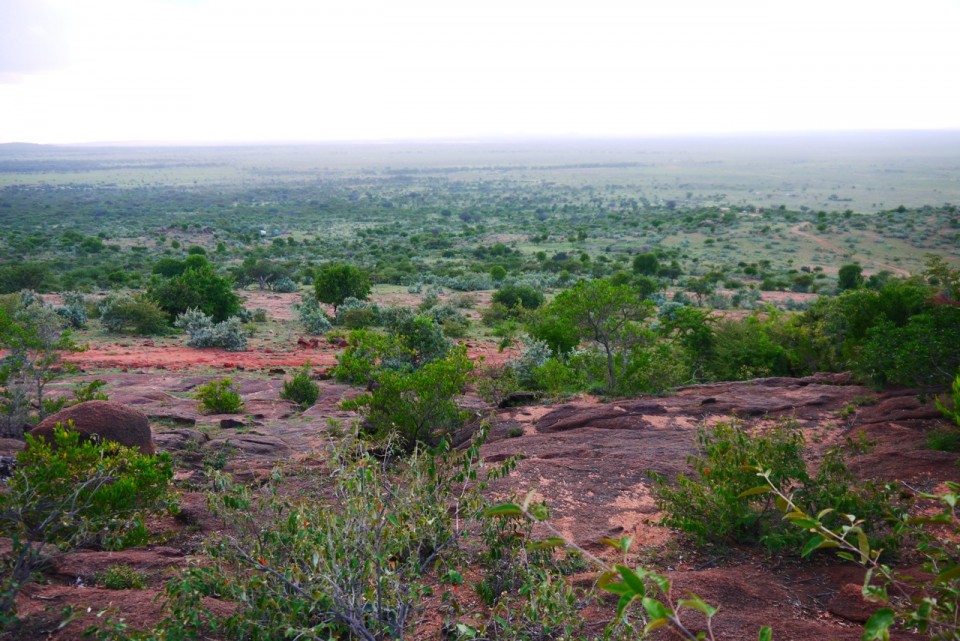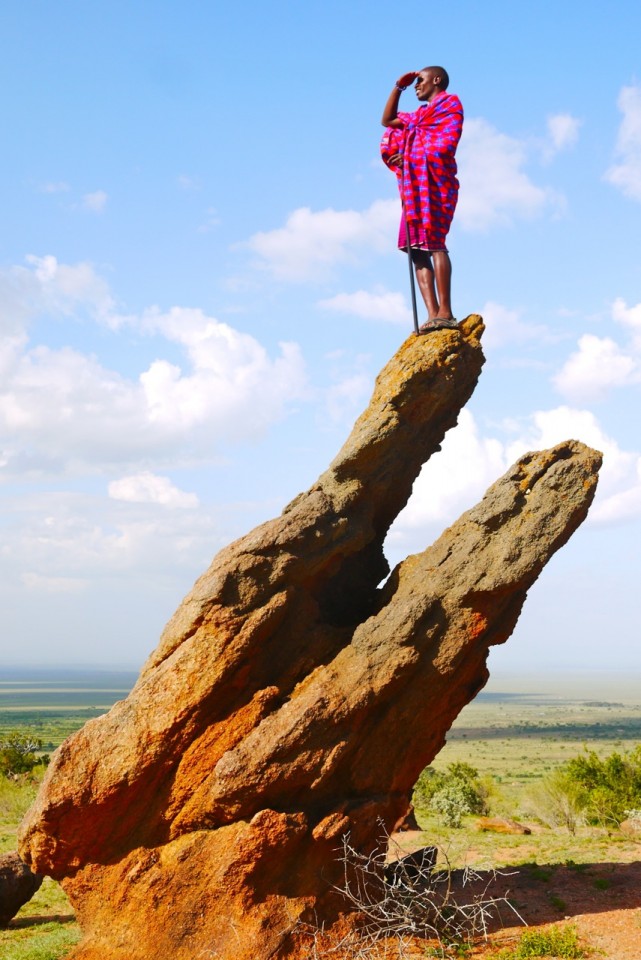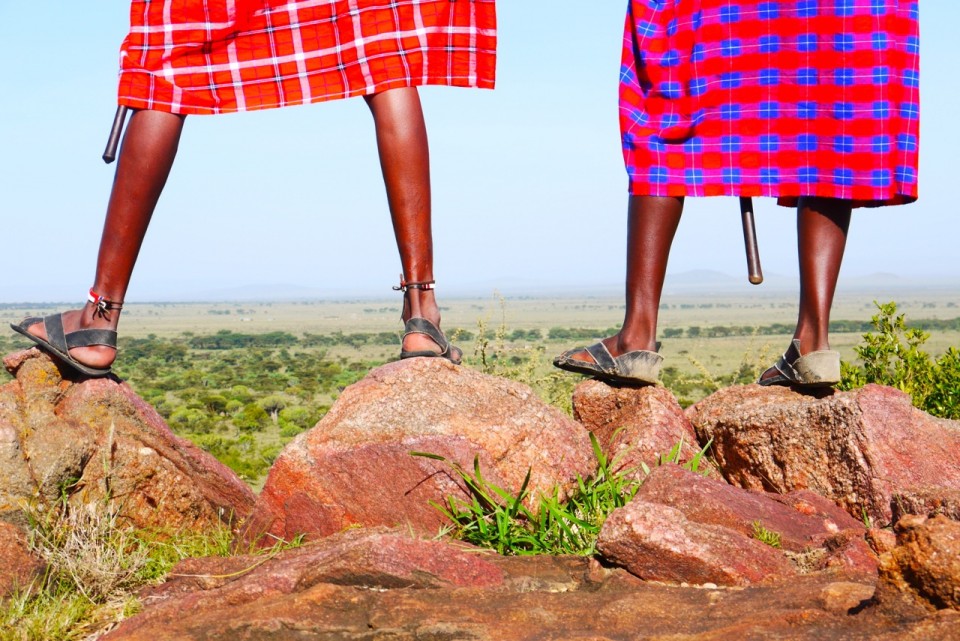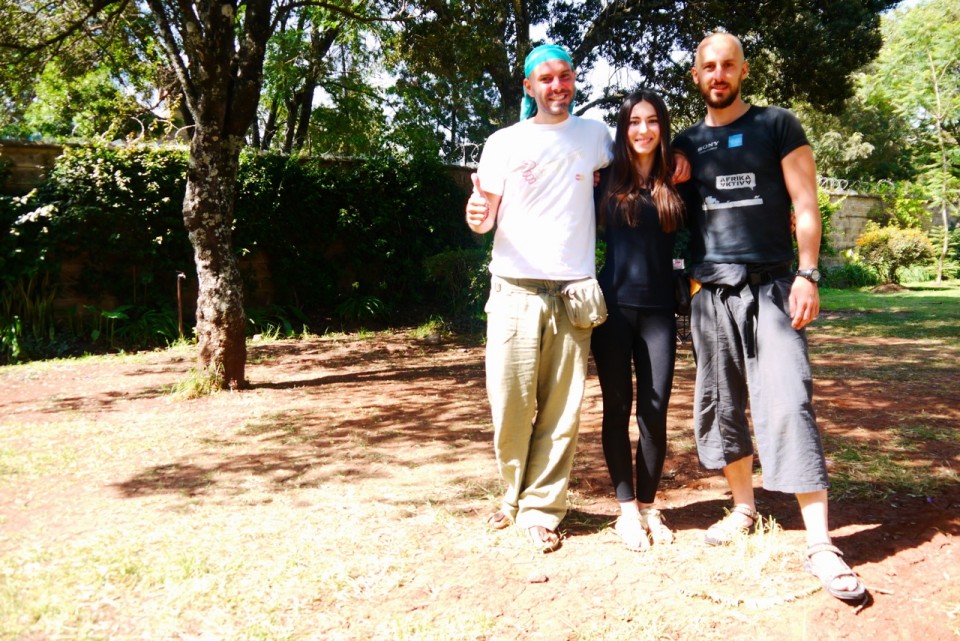I managed to get from Arusha to Nairobi in a single ride. I paid 50$ for a visa when I got to the border and entered the nineteenth country in the last seventeen months.
I made a stop at a restaurant with the driver and co-driver and in that way I got my first Kenyan meal, had my first Kenyan beer and talked to the first member of Masai tribe I ran into in Kenya.
By the way, the members of the Masai tribe live on the territory of Tanzania and Kenya and they don’t need to have a passport to be able to cross the border; they always wear colourful clothes and jewellery and they always carry a knife and some sort of a wooden axe with them. Every now and then you can spot one carrying a mobile phone, but, mostly, they live half-nomadic life and their main occupation is cattle breeding.
I did see a few of them while I was in Tanzania but I never managed to talk to them. The destiny, of course, took care of that as soon as I arrived to Kenya: an unknown girl contacted me via Facebook offering me a free two-day stay in a village, in the company of Masai warriors. She’d been there a few months before me after which she won a free two-day stay for two people and decided to share her prize with me. The kindness of the strangers.
I didn’t like Nairobi: smog, dust, noise, crowd, chaos on the streets. It reminded me of Dhaka, the capital of Bangladesh and of my first journey outside of Europe. At that moment I’d liked the chaos since it was something new and unusual. Now I got the feeling that I would go mental if I were forced to wander through these streets for a few days in a row. I was getting old. Or, conversely, I had a chance to see what was in offer and I preferred more peaceful environment.
Soon I would be leaving Nairobi; Masai warriors were expecting me.
Since I had a precise date of arriving to Maji Moto early in the morning I got into matatu (the main transportation in Africa – overcrowded vans. It’s interesting that in every African country they used a different term: matatu in Kenya, dala dala in Tanzania, motola in Malawi, chapas in Mozambique, black taxi in South African Republic and so on) which led me to Narok. That was where I had to hitchhike again in order to get to my destination. Every now and then a tourist bus would drive by on its way to Masai Mara, the most famous national park in Kenya, but not one of them showed any signs of noticing me. Quite understandable.
During the following 20 kilometers or so I changed three cars/vans/trucks after which I found myself on a narrow road leading to Maji Moto. I only had some 10 kilometers to get to the village. There was no traffic whatsoever. Two hours on foot. Luckily, I’d left my big backpack in Nairobi.
While I was walking down the road there was no one else but zebras, antelopes and wildebeest who observed me curiously. It was a wonderful sunny day and not too hot. There was no sign of civilization. It felt great just being there and listening to the silence.
The idyll was interrupted by a wildebeest which was standing still in the middle of the road some 100 metres in front of me. I stood there thinking if I had ever heard of a case in which a man was attacked by one of them. Since I couldn’t recall any warning or any horror story, I carried on carelessly. I waited for it to move and thought about my options of escape or self-defense in case it decided to attack me. The only thing I could use was a half-empty/full bottle of water.
After a few minutes the wildebeest simply took off, not paying any attention to me: I thanked him for that and carried on. Also, I promised him that I wouldn’t be writing anything about me being brave and making it run away by shouting at it and running towards it. I won’t say that the wildebeest was a coward. It wouldn’t be fair.
An hour and a half later I arrived at the spring of thermal water after which Maji Moto got its name (Maji=water; Moto=fire). There were some local people at the spring, both children and the adults, taking their baths naked and washing their clothes. Only few of them approached me, giving me curious looks and smiling after hearing my English. They were cute.
Chief Sankale? – I uttered the name of the chief of the Masai tribe who was running the eco camp to which I was headed to. After a short time of consulting with the others the youngest member of that nudist group approached me and showed me the direction I should stick to. Thank you, kiddo!
However, I did manage to lose my way a couple of times; I ended up in a yard of a family at the top of the hill, but, at the end I managed to fined Maji Moto eco camp. The first thing I noticed there was a bunch of surprised Masai warriors. They wanted to know how I had managed to find them. Easily, I’d walked the last ten kilometers and asked the people in the village for the direction, I said.
Take a rest, you’ve arrived at home – that was the answer they gave me with an accompanying big smile. The moment I senses the honesty in their pleasant words I was finally convinced that I, indeed, did find a home.
Not long after that we were joined by a family from Netherlands who was planning to spend the following two days there. We instantly became friends in an improvised restaurant with a beautiful view on the savannah. They bought me a beer and with that we began our friendship. I’m easily bought, even with the warm beer.
When the sun slowly began setting down it was time to take a walk. The guide showed us how to make a tooth brush with a branch, which plant can be used in fighting back nightmares, which leaves could be used instead of a deodorant or toilet paper, the uses of aloe vera etc. I really enjoyed the tour. I was thrilled to see the cooperation of a man with the nature: the co-life and mutual respect. It was something that had been lost in the developed countries. It was something that the people in the developed countries were just starting to think about.
We aren’t religious. But we are spiritual. We believe in Mother Nature. She provides us with everything we need. She is the only one we can rely on and she has never let us down. Sun makes us happy every morning, without an exception.
We listened to the guide attentively hanging on his ever word which was, once you think about it, quite logical. Also, all primitive people shared these attitudes. All of them had one god – Nature. Even the silliest members of the human kind realize that the Nature is everything. So, the question is: who is, in reality, primitive, and who is developed? Are the persons who live modestly, in concordance with the nature and who are able to survive even in the most extreme of the conditions truly primitive or primitive are those who are constantly destroying that very same nature and who would probably, without technology, die the very instance? Can we call developed those nations who feel the need to give a name and promote their god as if theirs was the only one and the best, or those who worship only one who is always present and visible to everyone?
The truth is probably somewhere in the middle. Both extremes have a lot to learn from each other. Still, it is a great shame that one side (let’s call it the Majority) has destroyed the other one (let’s call them the Minority), all in the name of truth they were supposedly promoting.
—
After the dinner we all gathered up next to the bonfire where we exchanged some stories of the previously mentioned two extremes. Chief Sankale talked the most.
He told us the Masai men were polygamous since the animals in their environment were also polygamous. They ate exclusively meat (cow, sheep and goat meat), drank only milk, water and cow’s blood (they claimed it gave them strength). They didn’t farm the land but they picked the fruit from the trees when there was something to pick. They slept only a few hours a day. The men’s job was to take care of the cattle, while the women were supposed to take care of the house and the chores. He told us that he had killed three lions and that he was chosen to be the chief among other 36 brothers. Also, he said that every woman you want to be your own costs seven cows. There weren’t differences among women, just like they didn’t make any difference among the days of the week. They didn’t need money. Furthermore, he told us that it wasn’t unusual for them to walk 100 kilometres daily in order to find water for the cattle. They couldn’t afford taking afternoon nap since a lion could eat their cows. Also, men, if they wanted to become warriors, had to train for seven years in the African wilderness. The training for the women lasted only four years. One way of their initiation was circumcision. During the initiation they couldn’t even blink: everything not to ruin their pride. They believed that if they weren’t afraid of the blade of the knife they wouldn’t be scared of anything.
I asked him about circumcising women and that was when the things got a bit more serious.
The fact is that the circumcision is still present in the Masai tribe. It’s a part of our culture; we believe that you cannot become a full member of the group if you’re not initiated properly through the process of circumcision. However, our tribe has brought some changes so we give the girls the choice: they can choose whether they want to do it or not. In fact, my daughter was the first girl in the tribe who refused being circumcised. In a way, she started a trend. Still, there are some girls who want to do it in order to keep the tradition, but we’ve come to the point in which it is okay to say no.
Also, the number of young people who go to school, who are educated, is growing constantly. I get to decide who will go to school and who will become a warrior. If a family has four children two of them will go to school, while the other two will become warriors even though, if it were up to the children, all of them would become warriors. It is a thing of prestige.
So, we sat there for hours talking about everything. I talked them about Croatia and how things worked out there; how it was in the rest of the world. I told them about the other tribes that share their view of life. Unfortunately, the most of them were headed towards wrong direction: they were following money and power and didn’t care about the damage they were leaving behind. I tried to explain to them why people went to a tanning saloon, to a gym or on a diet. I didn’t manage.
I asked them if they thought that they were missing something; something they would take from us, people from the West. Their answer was – no. There were some things which would make their lives easier, but they were perfectly satisfied with what they had.
What would you do if you came to Europe on a road trip?
Their answer really made me laugh: We would go to the zoo and asked them to give us back our lions. Lions don’t belong to the zoos, their place is in the wilderness – our, African wilderness. After trying to do this, we would try to do the same things with cows.
Other than lions, the Europeans were also taking cows from the peaceful Masai tribes. In that sense, they believed that all cows in the world were theirs. I stopped for a moment, not being in a mood for laughing anymore. I tried to explain to them that wouldn’t be a good idea. They wanted to know why. I started describing the conditions in which the cows were forced to live in western world. I told them about the farms where cows (and also other animals) spend their lives in a space so narrow that they could barely turn around themselves.
But, why? – one of them asked me while the others were silent. I could sense the silence and the lack of understanding; sadness. I shut up and changed the subject. I told them that they wouldn’t understand if I told them everything. After all, I didn’t understand it. The Dutch went to bed. I stayed for a while with them. Soon, I was rewarded for doing so.
– Are you up for an African Jacuzzi? – the chief asked me, starting to get up.
– When?
– Now – Sankale said while throwing me a towel.
Two Masai men, two Masai women and me. We went to the spring of thermal water. There was no one there in that late hour so we took off our clothes and got in. We had wonderful view: millions of stars on the sky.
That was it.
The following day we went to visit the local school after which we headed back to the camp on foot followed by wild animals. We talked to the guide who liked listening to iThing but, still, wouldn’t trade two cows for it. Anyway, he wouldn’t have time to listen to it since all his cows would wander off. When we were back to the camp we witnessed the traditional Masai tribal dance, that is, jumping up (the one who jumps the highest is the best), and playing dodge ball with some cane leaves which, as I’d been told, hurt really badly once they hit you.
I thought that my Dad would really love Kenya. I was thinking of bringing him there. However, I’d already had a reservation and paid us the 8-day safari, and all with the help of my MasterCard and the money from my sponsors. It is really nice to have some money in the situations like that one. However, after those eight days we were planning to go to Mali Dom orphanage ran by father Miro, about whom I’d heard all the best. Well, I guess, I’d see.
After another evening spent next to a campfire and later in the thermal spring I returned to Nairobi. First I visited Ethiopian embassy looking for some information about the visa, but the lady ambassador, all covered up in tattoos and with an unpleasant attitude, created a lot of difficulties. She wanted me to show her my plane ticket telling me that the north of Kenya wasn’t safe since there were many thieves. Maybe I shouldn’t have introduced myself as being a writer. She instantly concluded that I was a journalist; or even a spy. I should remember that for the next time. Still, she told me to come back after a few weeks, before I go to Ethiopia, and that she would see if there was anything she could do.
That very same evening I met Davor Rostuhar, well known Croatian travel writer, and his girlfriend Maja who were in the middle of their trip across Africa on motorbike. They were going in the opposite direction. We prepared dinner, had some beer, exchanged some contacts: I told them about the people in the South, and they told me about the people in the North.
The next thing I know, I was getting up in 4 a.m. and taking a taxi to the airport. After a half an hour of waiting I spotted a familiar face:
– Well, son, where have you been?
—
YT VIDEO – KENYA (1):
